
How Do You Calculate a Vehicle’s True Cost of Ownership?
It isn’t news to anyone who has owned a vehicle before that owning a car costs more than your monthly payments. In fact, a common phrase the people use when thinking about the total sum of how much owning a specific vehicle costs is simply ‘cost of ownership,’ and there are many factors that need to be calculated in order for that value to be accurate. For many drivers looking to purchase a car, it’s easier to focus on the upfront costs, such as the down payment, monthly payment, and even what the yearly maintenance costs are expected to be. But, if you want to be financially strategic about buying a car, what you should really look at is the cost of ownership — and it might even change the way you drive and maintain your vehicle, too.
Comparing the cost of ownership for car you want to buy

While we would love to really know what the cost of ownership is for every car we are interested in buying, there isn’t exactly a sticker on the windshield for that. Websites like Edmunds are able to use data that has been collected by their team over the years to give their best estimate of the true cost of ownership of a vehicle, even including information such as your specific location. These online calculators are easy to use and usually a free service, but they aren’t completely foolproof.
The up-front and basic costs of buying a vehicle

According to Edmunds, there are as many as eight major factors that should be taken into account when trying to calculate a vehicle’s cost of ownership. The first few factors seem relatively upfront as they have a lot to do with how you finance the vehicle, to begin with. These costs include the interest you are expected to owe when financing a vehicle, as well as any taxes and fees associate with vehicle purchases, title transfers, and registration. If applicable, annual registration fees and inspection costs should be taken into account as well.
In almost every state, you are required to carry insurance for a registered vehicle, and there are many factors that are taken into account when it comes to vehicle insurance. Some of these factors or vehicle-dependent, like the type of car, age of the car, and even overall value of the car. Other factors to consider are more personal, such as age and driving record. Regardless, this payment is also calculated into the overall cost of ownership for your car.
Othe factors that work into cost of ownership

Vehicle maintenance and repairs are another cost that many buyers might choose to overlook when picking out a new or even used vehicle. The yearly repair and maintenance costs for a vehicle can vary drastically, and the car that you choose can make a big difference when it comes to how big those payments can be. For luxury and performance car brands like BMW and Audi, yearly maintenance and any necessary repairs are typically higher. This is also part of the reason why these cars depreciate so drastically and so quickly.
Brands that require fewer specialized parts, such as Toyota and Nissan, are typically less expensive to maintain, and when something does break you won’t feel as stressed waiting for the mechanic bill to come in. Besides these factors, gas is another obvious and major cost of car ownership. Some cars require higher octane gasoline, which is more expensive, leading to higher yearly totals for gas, and buying a car that isn’t fuel efficient does just the same.
All of these costs are important things to keep in mind whether you are deciding to keep your current car, or even looking at your next car to purchase.


